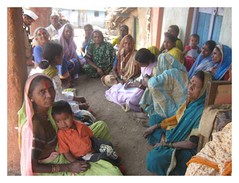 |
| Rally to Restore Sanity, from Steve Rhodes' photostream on Flickr (by-nc-nd) |
When sustainability poses complex and often tangled questions, how do we answer them?
In international circles before, at and since Rio, we're seeing strong arguments for a science-led agenda – from Earth System Science and planetary boundaries, to climate science, to the uses of biotechnology to tackle the challenges and opportunities of food production. With initiatives such as Future Earth and the UN's High-level Panel on Global Sustainability, we are seeing important arguments that science needs to play a central role in debating and shaping planetary futures.
However, all too often, this translates into a view where expert scientists should be providing the evidence to counter the short-term, electoral cycle driven interests of national politicians – and the ignorant, ill-informed or self-interested publics who vote for them – in order to drive policies to save the planet.
In the arena of food, according to this view scientists need to work against the 'march of unreason' that raises concerns about technologies such as GM crops, in order to feed 9 billion people by 2050.
As a complex world attempts to move towards a post-2015 agenda and set of SDGs, will this simple view of 'expert science' and science vs. politics get us there? I believe not, and that we need to democratise science in 3 fundamental ways.
1) Evidence and values in debate
First, we need to recognise that complex, multi-scale challenges around global sustainability are open to diverse policy approaches that couple evidence and values in different ways; deciding between them needs democratic debate.
Take a particular challenge, such as ensuring the right to food for all within global and regional boundaries of climate change, land use change, biodiversity loss, and nitrogen use.
Diverse current proposals include:
- investing in raising the productivity of small scale food producers;
- promoting agro-ecological techniques that sequester carbon in soils;
- promoting large-scale, input-intensive industrial agricultural investments;
- creating pest-resilient and high-yielding genetically modified crop varieties;
- or a variety of other possible approaches.
This means a diverse group of policymakers and publics should be allowed to debate the implications. The job of science is to provide the data, and let a more open, democratic process be the judge.
2) Expert citizens
Second, the science and evidence that feeds such debate can come from citizens as well as experts; or put another way, citizens can be experts too.
Citizen-led investigations, local knowledge and experiential expertise – as revealed in activism and ethnography - have successfully revealed climate change impacts in Indian cities, untangled ecology-disease interactions in Bangladesh, and underpinned farmers seed experimentation and selection in Kenya, among many other things.
Clearly, not all citizen expertise stands up to scrutiny as a scientific mode of thinking – and even some that does is embedded in different language, metaphors and worldviews. This means that while we badly need hybrids of scientific and citizen expertise to address complex problems, it's not just a matter of filling in gaps in each other's knowledge. Democratic debate is needed here too about the content, meanings, and contributions of different framings and lines of evidence, founded on mutual respect and openness.
3) Taking science to global publics
Third, this means a different model for science and politics on the global as well as national stage.
The current, growing emphasis is on having more scientists in politics – whether it's through more MPs with a science background, or science advisors and expert science committees informing policy and politics, including internationally. This can lead to a linear, technocratic vision where science leads politics. This is a potentially highly dangerous - a democratic political process, surely, should have a more accountable relationship with scientific expertise, with scientists 'on tap, but not on top', as Winston Churchill put it.
 |
| Manifesto roundtable, Marathmoli, from STEPS Centre's photostream on Flickr |
I'd argue that science needs to move out of the expert political establishment into wider international society. A democratic political process needs to be informed by citizens and publics who debate its content, processes and meanings and bring this into voting on public issues, and into international consultation processes such as those currently building up around the post-2015 agenda. We need to recognise and re-legitimise scientific sensibilities and concerns as part of the knowledge and interests of voting, participating and creative publics, whether on the streets of Rio or the fields of Kenya.
Science is of course a vital contributor to contemporary societies, and nowhere is it more important than when global societies debate future planetary sustainability.
But it's essential to have a proper debate about what directions of science are linked to what kinds of change and for whom: it's a debate that should be globally participatory, democratic and inclusive.
